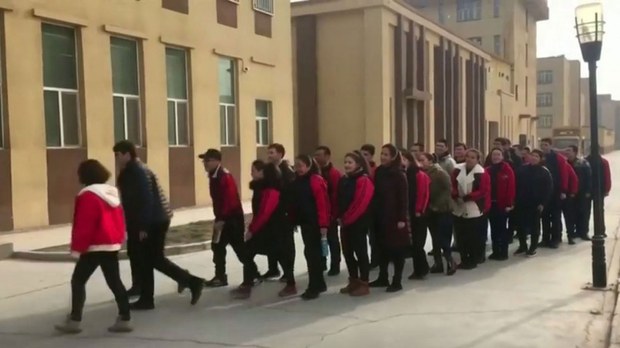‘Why Won’t You Let The Uyghurs Tell The World What’s Happening?’

Radio Free Asia, 30 November 2020

Below is an article published by Radio Free Asia. Photo Reuters
Asiye Abdulaheb, 47, is a Dutch woman of Uyghur descent who made media headlines in December 2019 for her role in passing on leaked Chinese Communist Party (CCP) documents detailing the incarceration of around 1.5 million Uyghurs and other Muslim ethnic groups in “re-education” camps across Xinjiang.
Abdulaheb was part of a chain of Uyghur emigres who passed on the papers, which were eventually analyzed and published by the International Consortium of Investigative Journalists (ICIJ). A former civil servant who fled the country with her children in 2009, she has since been the target of online attacks and death threats, while the Chinese state security police tried to recruit her ex-husband to spy on her. She spoke to RFA’s Mandarin Service about the huge gap between official CCP propaganda about Uyghurs and the situation on the ground:
When people began to question the existence of re-education camps in Xinjiang, Chinese officials denied it.
When questions started to be asked in the international community about forced labor in the “re-education” camps, Chinese officials said they were there for “vocational training.”
They said the “training centers” were needed to eliminate extremism and terrorism.
When the international community condemned the policy as a form of genocide against ethnic minorities, Chinese officials claimed that anyone in a “vocational training center” could leave of their own free will once they had completed their “training.”
But if, as they say, the Uyghurs are so happy, then why doesn’t [the CCP] let us meet with them? Why don’t you let them come out and tell the world clearly what is going on, and clarify the situation?
They need to be allowed to speak to the world, and then there would be a lot less laborious work for the Chinese government. They could just let Uyghurs leave the country and talk directly to the rest of the world.
If these [policies] are so great, then why has the Chinese government forcibly cut off contact between Uyghurs in China and their overseas relatives? [Since 2017], we haven’t even been able to call them on the phone, let alone have contact online.
My WeChat account has been shut down. It was automatically deleted by the Chinese authorities. All sources of information have been cut off.
The employment transfer and poverty alleviation schemes have left many children, women and elderly people with nobody to care for them.
This is particularly serious for the Uyghurs in the southern part of Xinjiang, where they have set up large numbers of orphanages, care homes, Hope Primary Schools, and boarding schools to care for them.
Actually, the Chinese government started to promote boarding schools for rural children as far back as 1994. The main aim of that policy was to ‘change the demographic structure.’
They forced Uyghurs to learn Chinese and replaced Uyghurs with Han Chinese. They had basically already achieved this [before they built the camps].

